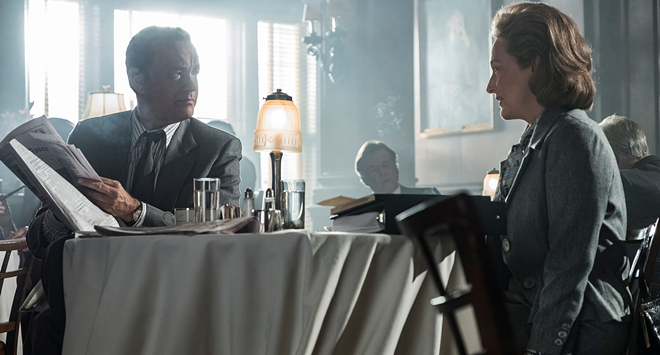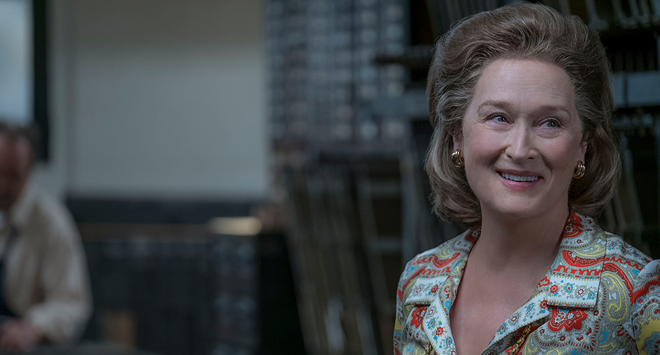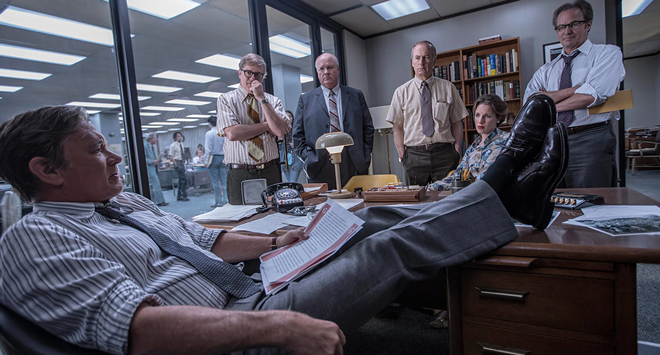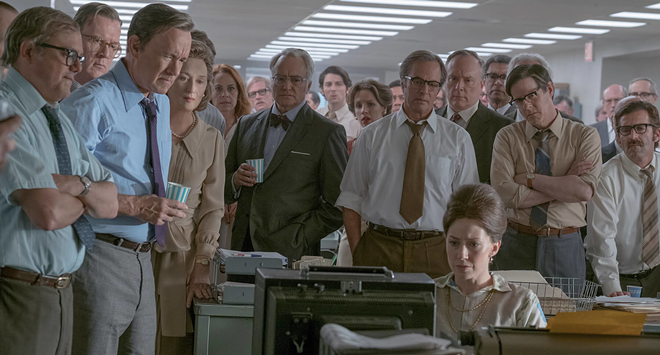
Little ones, gather around the fire as we begin a tale when once upon a time there was something called the "freedom of the press" and before fake news was an alarm that presidents used to scare their children into obedience. Back then there were printed-paper thingies known as newspapers that were delivered to your home around 5 a.m. with a resounding thwack on the driveway. You eagerly read it over morning coffee to learn any developments since you had last watched the previous evening’s 6:00 national news.
Newspapers mattered. News mattered. Truth mattered.
In 1967 a report on the abject failures of the Vietnam War was commissioned by Kennedy and Johnson’s Secretary of Defense Robert “Fog of War” McNamara. The U.S. had been in Vietnam one way or another from 1945 to 1967, costing nearly 60,000 American lives. This 7,000 page report that came to be known as the Pentagon Papers basically concluded that the government had known for years that the U.S. could not win. Yet one president after another (Truman, Eisenhower, Kennedy, Johnson, Nixon) continued to send American combat and support forces into war rather than admit to the American public that we were essentially already defeated. We feared the domino theory of one Asian state after another falling into Communism, and we feared the humiliation of a vanquished U.S., so thousands more troops were sent to the steaming jungles with no likelihood of success. Even admitted covert operations and election interference had brought us no closer to victory.
During the Nixon administration, Daniel Ellsberg, employed by the RAND Corporation and embedded as military analyst in Vietnam, makes this devastating report clandestinely, and illegally, available to the press.
The government shit hits the First Amendment fan.
This crisis of constitutional proportion came just weeks before Watergate and the subsequent cover-up of that. More shit, more fan.
Publish then perish was the all-too-real fear, but The New York Times and The Washington Post persevered. And thus a movement and a movie were born.
Steven Spielberg directs Meryl Streep and Tom Hanks in The Post, a docudrama about the unlikely partnership between The Washington Post’s Katharine Graham (Streep), the first female publisher of a major American newspaper, and editor Ben Bradlee (Hanks), as they race to catch up with The New York Times to expose a massive cover-up of government secrets that spanned three decades and multiple U.S. Presidents.
Hanks is irascible with loads of charm under the flint. Streep gives a performance of great elegance and grace. The two must overcome their differences as they risk their careers, and their very freedom, to help bring long-buried truths to light. The whistle-blower Ellsberg is played by Matthew Rhys, channeling his own creepy subversiveness from FX's The Americans, there a hidden KGB agent, here the activist puncturing the hot air party-line posture with his Xeroxed and smuggled copies of the Pentagon Papers. The fate of America and Vietnam turned on the pivot of Ellsberg's encounter with Robert McNamara (Bruce Greenwood) and the massive dissonance between what the Secretary of Defense knows and what he says to a gullible citizenry.
With officially sanctioned government lies, and a female publisher struggling for acceptance in a man's world, the relevance of this film, set in 1971, for our time is chilling and uncanny. The screenwriters Liz Hannah and Josh Singer (screenwriting Oscar for Spotlight) have delivered a historical drama that resonates with a loud and forceful Right Now.
The parallels between then and now are ominous as politics, media, and gender collide. Just in this week’s news on Trump's new national security strategy with China and Russia, one commentator spoke of the "gap between the document and the foreign policy." Thus it has ever been, apparently.
In today’s post-truth, alternative-facts Trump World, journalists are dismissed and disdained, ridiculed and threatened with bodily harm. And the government tries to suppress such provocative words as “evidence-based,” “fetus,” “transgender,” “science-based,” “diversity” and others as a way to control and corral its view of truth. Then, as now, lies abound.

And Katherine Graham as the sole female in a testosterone-dripping boardroom must fight against her invisibility in the face of men who see her as little more than a caftan-wearing socialite only there because she’s the widow. In this year of Weinstein World’s reckoning with #Me-Too Misogyny, the corporate chauvinism of the 1970s is still very much with us. Graham has her Joan Crawford moment — as the apocryphal anecdote goes, when walking into her first board meeting with the Pepsi Cola Corp. after her husband’s death and her taking over the board, Crawford taunts the men “Don’t fuck with me boys. I’ve been to the rodeo before.” Graham herself has experienced a few rodeos and sets about claiming her destiny.
She has to fight her mansplaining and manspreading board of directors all the while fighting her own insecurities and fears about losing the family business. After all, the paper is threatened with injunctions and collusion, and the publisher threatened with legal clampdown, even criminal liability and prison. Streep is perfection personified as Graham discovers her inherent talent to publish a paper that is now hers, not her father’s, not her husband’s. It’s a delicious moment when she recounts this coming into her own and the effect of silencing the naysaying men. She shares that Samuel Johnson observation after he had heard a woman preach at a Quaker meeting. He commented that “a woman’s preaching is like a dog’s walking on his hind legs. It is not done well, but you are surprised to find it done at all.” As publisher of the Pentagon papers, Graham not only walks on her hind legs but gladly lifts one and pisses on those who say she should stick to reporting on the Nixon-Cox White House wedding rather than worrying her pretty little head with Vietnam and classified secrets.
It's an exhilarating film — even though we know the outcome before the film ever starts with its opening frames of jungle combat — as good guys (free press) fight the bad guys (government lies and interference), and a good woman (publisher Katharine Graham) must contend with the good ol' boys network who seem obsessed by her breasts. After all, Attorney General John Mitchell famously said that if she published the Pentagon Papers she'd find her "tit in the wringer," but (spoiler alert!) you won’t hear that juicy line in the movie. What you will hear are marvelous outtakes from Nixon's Watergate tapes with actual voices of Nixon, Halderman, Ehrlichman, Kissinger and Mitchell, as they spin their way through their anti-media vitriol and hysteria. Imagine: Calm women and hysterical men.
I’ve always found newspaper movies (Citizen Kane, Zodiac, Absence of Malice, All the President’s Men, Spotlight and media thrillers like Broadcast News and The Insider) thrilling as reporters dig for scoops, jockey for position, search for the smoking gun. They translate democracy’s ideals and values into typewritten words onto paper, then into hot lead and linotype as the presses rumble into building-jarring activity and dramatic views of the printing room where automated streams of finished newspapers fly to the ceiling before being loaded onto delivery trucks and dispersed to the waiting public. Never has the factory assembly line been filmed so movingly, as truth is precious and to be protected and celebrated. Sorry, releasing and updating news online just does not have that feverish intensity and theatrical flourish.
In The Post, it’s an analogue world — yes, my millennials, there once was another time and space with typewriters and inky ribbons, pay phones that required coins, office phones with long cords and party lines, copy machines the size of industrial refrigerators, hand delivery of documents, 15-inch black and white TVs, no computers (can you say microfiche?), vacuum chutes to deliver finished articles from one news department to another (say what?), no pixels, no cell phones, no internet — just a healthy smattering of ashtrays, alcohol, spiral notebooks, leisure suits, shoe leather, big hair and horn rims.
The Post gives us plenty of breathless activity as the very future of democracy seems to hang in the balance, for if the press is muzzled, no matter the reason, we lose the ability to question. And the point of a free press, as one character asserts, is to serve the governed, not the government. Ellsberg remarks, "We can't afford to let the President run the country by himself." A camera shot through the window of Nixon in silhouette working the phones reinforces this very real fear of an overreaching, vulgar, narcissistic, bombastic, paranoid, imperial Presidency.
Indeed.
I overheard one comment muttered at the preview (OK, it was mine) that President Trump should be required to watch this film every day for the rest of his time in office.
Kudos to director of photographyJanusz Kaminski as director of photography, Rick Carter as production designer, Ann Roth as costume designer, Michael Kahn and Sarah Broshar as film editors, and John Williams for the ever-stirring, never intrusive, just-right music. We have here an immaculately conceived, perfectly realized, and gorgeously detailed world of the 1970s.
May this crew all still be around, and Spielberg too, when the time comes to make the film of our own First Amendment heartbreak.





















